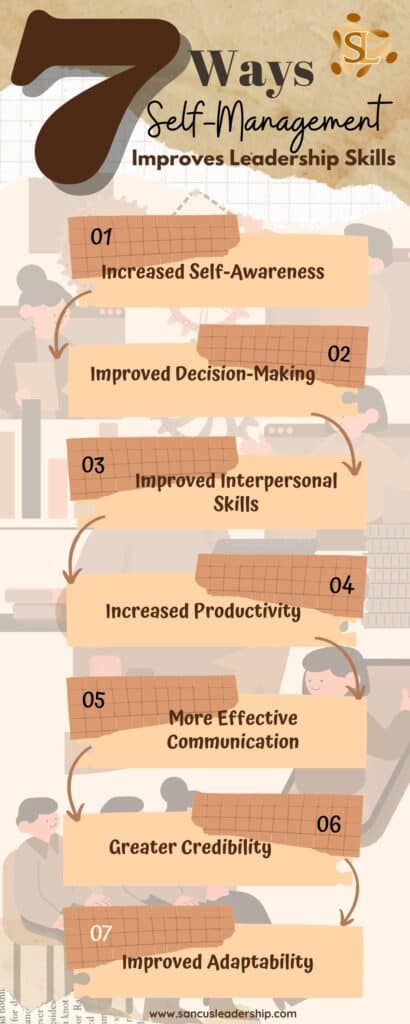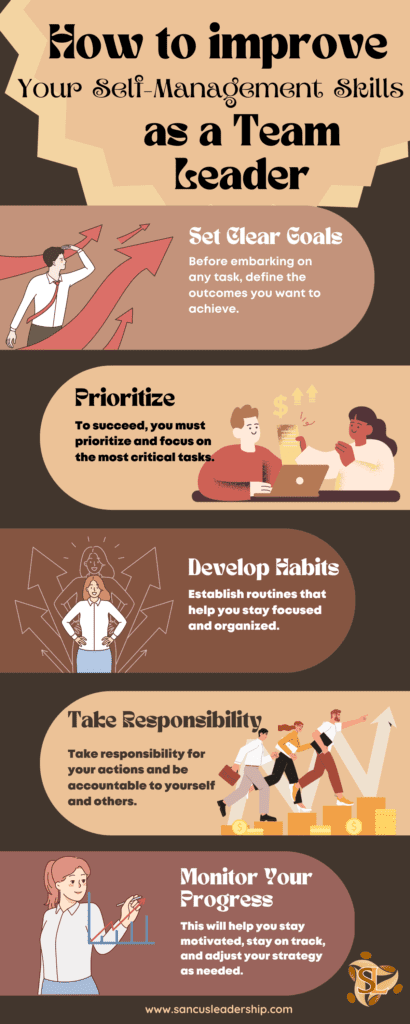The most rewarding thing I have ever done was to lead a small team of six bomb disposal experts. But to be completely honest, it was also the hardest. Leadership is complex and demanding, requiring individuals to juggle various tasks, responsibilities, and expectations. We must have strong self-management skills to successfully lead and manage a team.
Leaders need self-management skills to stay organized, focused, and productive. Self-management involves mastering self-control, managing feelings and emotions, and taking ownership of one’s actions. Skilled self-managers make wise decisions, prioritize tasks, and handle pressure efficiently.
Self-management skills are also essential for maintaining a healthy work/life balance, which is critical to the long-term success of any leader. Leaders with strong self-management skills are better able to cope with stress, handle criticism and take deliberate risks.
7 Ways Self-Management Improves Leadership Skills

Self-management is more than just managing your time. It’s about managing your thoughts, behavior, and emotions. It provides the foundation for effective problem-solving, allowing leaders to objectively evaluate different scenarios and alternatives before deciding.

Here are seven ways self-management can improve your leadership:
1. Increased Self-Awareness
As a leader, it’s essential to recognize your strengths, weaknesses, and limitations to make decisions based on facts rather than emotions. Highly self-aware leaders can assess situations from multiple perspectives, anticipating possible outcomes and taking initiatives that benefit the team’s collective goals.
Since you don’t spiral down into emotion-driven reactions and interpretations, you can stay true to your team’s mission and values.
Self-awareness is the enabling factor for emotional self-management; you can not change what you are unaware of. Therefore improving self-awareness should be central to any leadership development.
2. Improved Decision-Making
Leading a team requires sound judgment and the ability to make decisions quickly and confidently. Self-management skills help leaders stay focused on the facts and avoid being swayed by personal biases.
The best counter to subconscious biases is to make them conscious so that we can notice how they impact our decision-making. To fully understand cognitive bias and how to spot one, I suggest you read the book Thinking Fast and Slow by Daniel Kahneman (Amazon.com). It truly has changed the way I make decisions!
Self-managers can objectively weigh the pros and cons, allowing them to make more effective decisions that benefit their team. Mental focus and clarity of thought are also essential for managing challenging situations.
3. Improved Interpersonal Skills
Interpersonal skills are essential for managing relationships with team members, stakeholders, and other key organizational people.
Self-management skills give leaders the insight to understand what motivates others and the ability to remain composed when managing conflicts.
Leaders with strong self-management skills can also better empathize and communicate clearly, leading to more effective teams. How you interact with others often reflects how you interact with yourself.
Common interpersonal skills leaders must have that are also impacted by self-management:
- Empathy
- Active listening
- Patience
- Conflict resolution
- Teamwork
- Mediation
- Persuasion
Social interactions will help you understand your strengths and weaknesses and hone your interpersonal skills.
4. Increased Productivity
Increased productivity is the cherry on top of the cake for any leader. To be productive, leaders must clearly understand their goals and objectives and develop strategies to achieve them.
Self-management skills allow leaders to prioritize tasks appropriately, allocate resources effectively, and stay focused on the big picture. Self-managers can also better recognize and address potential problems before they arise, which could derail progress.
5. More Effective Communication
Leaders must clearly articulate their vision and expectations to their team to achieve success. Effective communication requires self-discipline and managing your emotions to avoid misunderstandings and motivate people toward a common goal.
When managing your thoughts and emotions, you’re more capable of listening actively, providing constructive feedback, and creating an environment of trust. You’ll also be able to maintain composure during heated discussions, which is essential for managing conflict.
6. Greater Credibility
Leaders who demonstrate strong self-management skills foster trust and respect among their team members. When your team sees that you’re managing yourself effectively, they’ll be more likely to follow your lead and trust your decisions.
Great leaders also exhibit self-discipline, respect for others, and a commitment to their team’s success. Since you make decisions based on facts rather than emotions, people will trust that your decisions are based on logic and reason rather than your emotional state of the day.
7. Improved Adaptability
Often, leaders encounter unexpected obstacles that require quick thinking and the ability to adjust course as needed. A team member may call in sick, a project may be delayed, or a budget cut may require the reallocation of resources.
Leaders with self-management skills can stay calm in the face of change and rapidly adapt to new circumstances. This flexibility and mental agility help leaders develop innovative solutions to complex challenges.
Here’s an interesting video where former CEO Helen Sanderson gives a talk on how self-management is the answer to happiness, productivity, and engagement at work.
How To Improve Your Self-Management Skills as a Team Leader

Follow these tips to improve your self-management skills:
Set Clear Goals
Before embarking on any task, define the outcomes you want to achieve.
What does success look like for you? Is it completing a project on time, managing your emotions effectively, or managing difficult conversations?
Having a clear roadmap will help you stay focused and on track. You don’t have to tackle your goals alone. Seek feedback and support from others.
Prioritize
To succeed, you must prioritize and focus on the most critical tasks.
To succeed, you must prioritize and focus on the most critical tasks.
Every morning I start with a walk, then I journal the three “must-do” of the day; I don’t work on anything else until those are finished.
This can help you stay organized and focused so you don’t get sidetracked by small tasks that distract from your bigger goals.

Develop Habits
Good habits are essential for managing yourself effectively. Establish routines that help you stay focused and organized. This could include setting aside time for reflection, setting daily reminders to review your goals, or scheduling breaks to help you stay energized. Take breaks when needed to stay motivated and energized.
I definitely recommend starting out really small when you’re building new habits. If your goal is to write a book, your habit shouldn’t be writing 1000 words before work. But instead, start by just opening the document and writing the first line. This will reduce the threshold to get started, and if you want to learn more, I recommend the book Atomic Habits (amazon.com).
Take Responsibility
Strive for excellence, and don’t be afraid to make mistakes. Take responsibility for your actions and be accountable to yourself and others. Learn from any missteps and use them as an opportunity for growth. This will also increase the trust team members have in you (how important is trust really?).
A truly great read is the book 12 Rules for life by Jordan Peterson. He is controversial, but his thoughts on responsibility are very interesting. Another good book about ownership is former Navy seal Jocko Willinks’s book called extreme ownership!
Monitor Your Progress
Self-management requires ongoing self-reflection and assessment of your progress. Set aside time each week to review your accomplishments and identify areas to improve. This will help you stay motivated, stay on track, and adjust your strategy as needed.
Over the years, I have constructed a pretty legit, if I might say it myself, spreadsheet where I can keep track of my monthly, quarterly, yearly, and five-year goals without paying a single dollar. You can find a copy of it here.
Final Thoughts
Strong self-management skills are essential for managing a team effectively. Leaders need the proper mindset and skillset to stay focused, remain calm under pressure, and make decisions that benefit the team.
| Skill | Benefits |
| Increased self-awareness | Enables leaders to make decisions based on facts rather than emotions |
| Improved decision-making | Helps leaders stay focused on facts and avoid being swayed by personal biases |
| Improved interpersonal skills | Gives leaders the insight to understand what motivates others, manage conflicts, empathize, and communicate |
| Increased productivity | Enables leaders to prioritize tasks, allocate resources effectively, and recognize and address potential problems |
| More effective communication | Allows leaders to listen actively, provide constructive feedback, and maintain composure during a conflict |
| Greater credibility | Fosters trust and respect among team members |
| Improved adaptability | Helps leaders stay calm in the face of change and develop innovative solutions to complex challenges |
Self-management skills give leaders the insight to understand what motivates others, build trust in their teams, communicate effectively, and stay productive. Ultimately, these skills give leaders the edge to maximize their potential and set a good example for their team.



